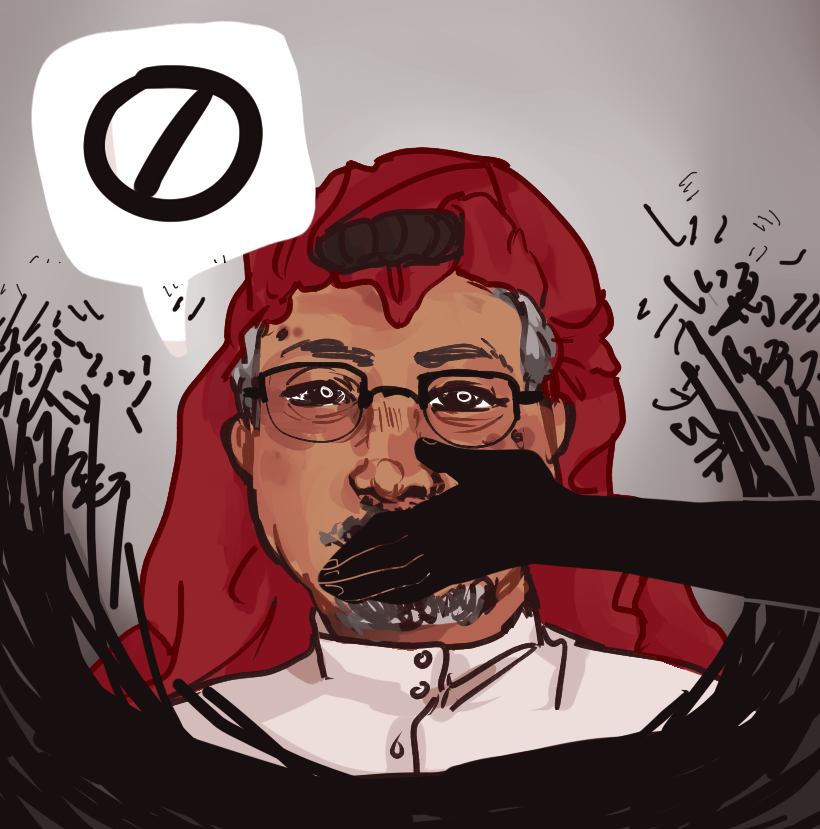The press is not the enemy of the people
An editorial based off of the death of Saudi Arabian journalist Jamal Khashoggi
Journalist Jamal Khashoggi silenced by the Saudi government because of his controversial views regarding the monarchy.
November 14, 2018
Zephyrus would like to notify readers that this article contains some graphic and potentially triggering language.
When journalists are killed for simply doing their jobs, the unalienable right to free speech as dictated in our constitution is threatened. Current political rhetoric and partisan behavior effectively silence those who are meant to amplify the voices of the people.
In February of 2002, American journalist Daniel Pearl flew overseas to cover the relationship between the notorious British bomber Richard Reid and the known terrorist group Al-Qaeda. Pearl went missing for two weeks somewhere in Pakistan, which was later confirmed as the location of his death. His kidnappers released a video depicting Pearl’s death and documenting his final words, which were a scripted speech condemning the United States’ relationship with Israel. Seconds later, Pakistani extremists sawed off Pearl’s head and held it up in triumph. The jarring image of Pearl’s severed head became a symbol of violence against journalists almost 20 years ago. Daniel Pearl’s murder was instigated by the United States’ relationship with Israel, as his last words were a scripted political message criticizing the United States’ military tactics. His attackers hoped to send one final message to the United States through an outlet the government would listen to—their own media.
A few weeks ago, journalist and known critic of the Saudi Arabian Crown Prince, Jamal Khashoggi, was declared dead after going missing for nearly three weeks. After blatantly denying any wrongdoing concerning the death of Khashoggi, the Saudi government is now calling the murder ‘premeditated’ after the public prosecutor was quoted confessing to the government’s involvement.
Even more recently, CNN White House Correspondent Jim Acosta was stripped of his White House press badge because his questions were deemed ‘too challenging’ and ‘inappropriate’. Acosta was seen at a White House press conference asking President Trump if the ad depicting immigrants in a caravan attempting to enter the U.S. was an attempt for Republicans to gain support before the midterm election. The president sarcastically responded to the question which prompted Acosta to ask a question about the Russian investigation. During Acosta’s question, President Trump called him out, saying, “I tell you what, CNN should be ashamed of itself, having you working for them. You are a rude, terrible person. You shouldn’t be working for CNN.” President Trump received extreme backlash for this comment, with NBC’s Peter Alexander defending Acosta, calling him a “diligent reporter” who “busts his butt like the rest of us.” This prompted President Trump to say to Alexander, “I’m not a huge fan of yours either, I hope you know that.” Notably, both NBC and CNN have been widely criticized by the Trump administration. Trump furthered his statement condemning CNN by saying, “When you report Fake News, which CNN does a lot, [the media] is the enemy of the people.”
Violence against journalists is on the rise, according to the Committee to Protect Journalists (CPJ). The CPJ states that 66 journalists were killed in 2017. To date, 64 have been killed in 2018 with two months until year’s end. These scary statistics are indicative of a growing trend, not a reduction, in targeted violence.
Administrations critical of their domestic news sources have only enforced the highly politicized issue of violence against journalists. During a rally on Oct. 18, 2018, President Trump referenced Montana representative Greg Gianforte, who was found guilty of physically assaulting a reporter. “I had heard that [the senator] body slammed a reporter…That’s my kind of guy, I think I can help him out with [the assault charges],” President Trump said as his supporters cheered from behind. This mob mentality is what perpetuates the normalization of violence towards the media. President Trump has certainly contributed to this violent notion, regularly calling news sources ‘fake’ and ‘crooked’ and even recently tweeting “The Fake News Media is the true Enemy of the People.” The administration is turning press-related violence into a partisan issue, further threatening the First Amendment.
Strong supporters of these political leaders have adopted this hostile mindset and acted upon this urge to harm the media. Recently, a far-right supporter of President Trump sent inactive explosives to many prominent media sources and Democratic politicians. The suspected ‘mail bomber’ was seen holding signs saying ‘CNN Sucks!’ accepting President Trump’s interpretation that CNN is ‘Fake News.’ In Brazil, the Brazilian Association of Investigative Journalism has received more than 141 threats, most of which stem from supporters of Brazilian President-Elect Jair Bolsonaro, who according to Vox News, has taken a page out of Trump’s book by referring to the media as ‘Fake News’.
Although these claims represent extreme actions and ideologies, it begs the question of responsibility. How much blame should our leaders bear? Every time Donald Trump fires off a Tweet condemning the media he has dubbed ‘Fake News’, he is continuing to cast doubt and distrust in a system on which our country was founded. Trump’s domestic rhetoric proves that he doesn’t have the legitimacy to criticize attacks on the press abroad. Even with the U.S. vowing to impose sanctions on Saudi Arabia due to Khashoggi’s murder, the ‘Fake News’ media that President Trump has sustained has tangible consequences in his home country.
The dangerous environment surrounding journalism may discourage potential journalists from entering the field itself. As a writer for Zephyrus, I can say with confidence that I am concerned for the future of journalism. The negative stigma that surrounds the press only deters people from entering the field. When leaders and politicians are using derogatory terms to undermine the foundation of the press, acts of violence and hatred towards journalists only increase in severity and probability. Journalists should be celebrated for their persistence to expose the truth, rather than punished for their determination.
With youth being taught that all journalists are the ‘True Enemy of the People,’ what kind of precedent are we setting? President Trump himself said after the summit with North Korea, “Anyone can make war, but only the most courageous can make peace.” This ironic statement directly contradicts President Trump’s dangerous domestic behavior. By constantly bashing the press, he is all but declaring war on journalists. These recurring threats must not be normalized. As the Commander-in-Chief of the United States, he must clean up his act so he is able to preserve the unalienable rights of his citizens.
As a citizen of the United States and as a journalist myself, I am calling for an immediate change in Donald Trump’s actions. Liberals and conservatives alike must be able to agree that turning a human rights issue into a partisan affair is completely unethical. Moral obligation must point our country in the right direction and we must realize that the violence faced by the press is completely unwarranted and extremely dangerous.
The highly politicized global climate exacerbates the relationship between journalists and their readers. The continuation of crude comments and dismissive remarks against the media perpetuate a skepticism of reliable sources. How can our country protect its vow to preserve First Amendment rights when the representatives for these rights are being slaughtered?



